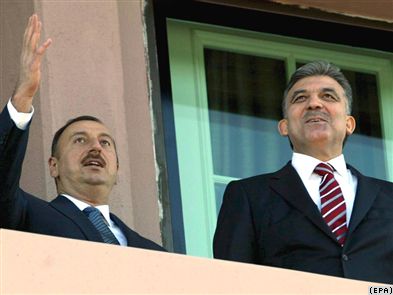
Ankara-Yerevan Rapprochement Strains Turkey’s Relations With Azerbaijan
Publication: Eurasia Daily Monitor Volume: 6 Issue: 68
By:

Rapprochement between Turkey and Armenia has been fast tracked as diplomats intensified their work in the past two months on possible ways of addressing the issue (EDM, February 10, March 27). Ankara and Yerevan now appear poised to find a solution to their bilateral problems. However, Azerbaijan’s leadership is dissatisfied by the prospect of any rapid improvement in Turkey’s relations with Armenia. On April 2 Azerbaijan’s Foreign Minister Elmar Mammadyarov said, "If the border is opened before Armenian troops withdraw from the occupied territories of Azerbaijan, it will run counter to Azerbaijan’s national interests. We have conveyed this opinion to the Turkish leadership" (Hurriyet Daily News, April 2). Azerbaijan’s President Ilham Aliyev played the energy card and warned: "before finding a way to solve the Karabakh problem, if Turkey cuts a deal with Armenia we could cut off the natural gas flow to Turkey" (Referans, April 2).
Azerbaijan and Russia’s Gazprom recently signed a "memorandum of understanding" on long term cooperation on natural gas investment (Referans, April 2). This development was considered as a critical move from Azerbaijan, since it is one of the supplier countries in the troubled Nabucco pipeline project. In addition, President Aliyev declined an invitation from President Abdullah Gul to attend the United Nations Alliance of Civilizations UNAOC forum in Istanbul, preferring instead to send his daughter to represent the country, conveying his discomfort over Turkish-Armenian reconciliation (EDM, April 8).
Turkish opposition parties and pressure groups have also raised objections against the possible re-opening of the Turkish-Armenian border. The leaders of the opposition Republican People’s Party (CHP) and Nationalist Action Party (MHP) have criticized the government’s rapprochement policies (CNNTurk, April 7). Moreover, the Federation of Turkish-Azerbaijani Circles (FTAC) sent letters to Turkish President Gul and Prime Minister Tayyip Erdogan expressing their concern. In its letter to Erdogan the FTAC asserted that "no Turk would want to see Turkey opening its border with Armenia unless Armenia withdraws its troops from Azerbaijani land" (CNNTurk, April 5). In addition, new internet forums have been set up to help organize protests against the Turkish government’s policy of rapprochement with Armenia (Zaman, April 9). Public protests, although currently small-scale, have also begun in the cities of Kars, Gaziantep, Igdir and Amasya showing popular discomfort surrounding Turkey’s reconciliation policy (www.azg.am, April 9).
While Azerbaijan and the Turkish opposition parties have objected to Turkey-Armenian reconciliation before resolving the Karabakh problem, the U.S. has encouraged Ankara to press ahead. President Barack Obama during his recent visit to Turkey underlined the U.S. position:
We have already seen historic and courageous steps taken by Turkish and Armenian leaders. These contacts hold out the promise of a new day. An open border would return the Turkish and Armenian people to a peaceful and prosperous coexistence that would serve both of your nations. That is why the United States strongly supports the full normalization of relations between Turkey and Armenia (Today’s Zaman, April 7).
It seems the Turkish government appreciates the difficulties in opening the border prior to satisfying Azerbaijan’s concerns. Obama has recognized Baku’s sensitivities on the issue and directly involved himself in the process of explaining Washington’s position. After his visit to Turkey, Obama held telephone conversations with Azerbaijan’s president Aliyev about his support for Turkish-Armenian efforts to normalize relations (CNN Turk, April 8).
Nonetheless, Ankara is optimistic about improving its relations with Yerevan, despite these objections. Turkish Foreign Ministry spokesman, Burak Ozugergin, stated that "the developments on the talks between Ankara and Yerevan are promising and we are happy about that" (CNN Turk, April 5). As a sign of progress, Turkey’s Foreign Ministry has now changed the conditions for reconciliation that were previously posted on its website. These were: 1) Armenia should officially recognize the existing border between Turkey and Armenia, 2) Armenia rescinds its claim about Armenian "genocide" and 3) Armenia must end its invasion of Azerbaijan’s territory. In late March however, the Foreign Ministry altered its website (Haberturk, April 9). The Turkish language section contains a statement that "ill-disposed policies pursued by Yerevan towards its neighbors have discouraged Turkey to establish diplomatic relations with Armenia." However, the English version adds: "Armenia continues to disregard the UN Security Council Resolutions Numbers 822, 853, 874, and 884, disrespecting the territorial integrity of Azerbaijan by occupying over 20 percent of Azerbaijani territory" (www.mfa.gov.tr, April 9).
These factors indicate that Ankara has been pursuing a carefully calculated foreign policy changes. Therefore, it is expected that the Turkey-Armenia rapprochement will be gradual in order to ensure its steady progress. Reportedly the border between Armenia and Turkey will open incrementally. According to this plan, it will be opened initially as a purely symbolic gesture and will only open once each week. In the meantime, diplomatic relations will commence with both parties declaring their intention to open embassies in Ankara and Yerevan. In addition, the plan refers to the Karabakh problem and requests that Armenia withdraws its troops from the five provinces of Karabakh it currently occupies (Sabah, April 9).




